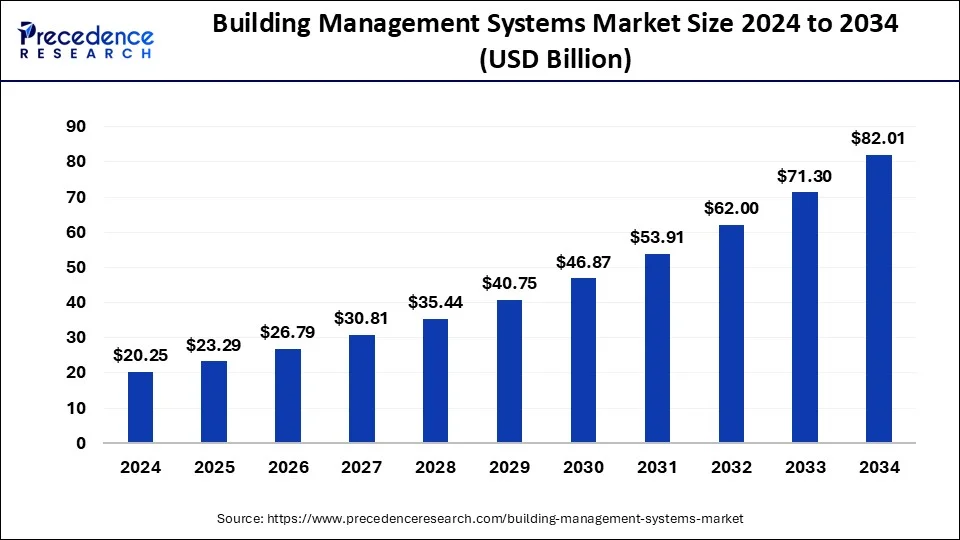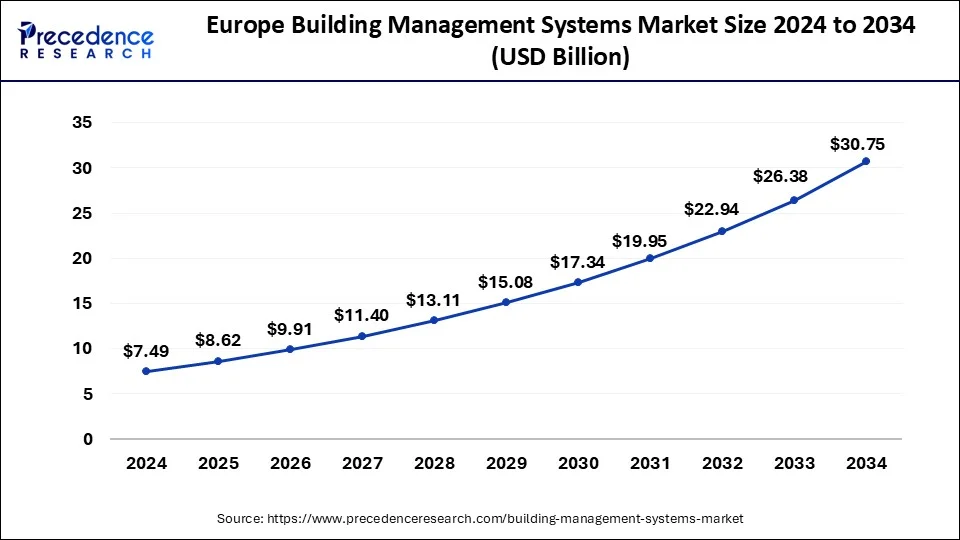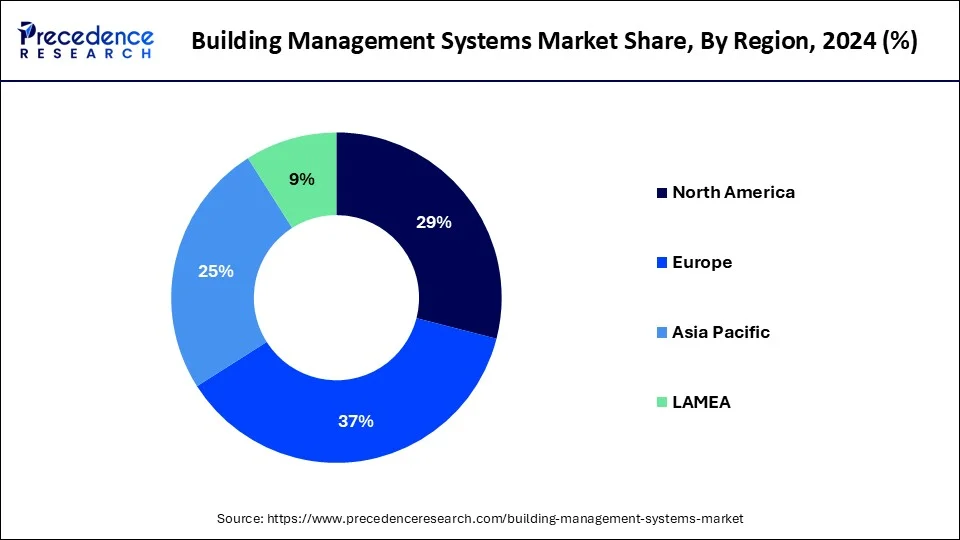Building Management Systems Market Size and Forecast 2025 to 2034
The global building management systems market size was estimated at USD 20.25 billion in 2024 and is predicted to increase from USD 23.29 billion in 2025 to approximately USD 82.01 billion by 2034, expanding at a CAGR of 15.01% from 2025 to 2034.The rising use of smart sensors and IoT devices is observed to promote the building management systems market growth in the coming years.

Building Management Systems Market Key Takeaways
- The global building management systems market was valued at USD 20.25 billion in 2024.
- It is projected to reach USD 82.01 billion by 2034.
- The building management systems market is expected to grow at a CAGR of 15.01% from 2025 to 2034.
- Europe dominated the building management systems market with the largest market share of 37% in 2024.
- North America is anticipated to grow at the fastest rate in the market during the forecast period.
- By software, the energy management segment held the largest share of the market in 2024 and is expected to sustain its position throughout the forecast period.
- By software, the security management segment is expected to witness considerable growth in the market over the forecast period.
- By application, the commercial segment dominated the global market in 2024.
- By application, the residential segment is projected to expand rapidly in the market in the coming years.
How Artificial Intelligence is Impacting the Growth of the Building Management Systems Market?
As technology continues to evolve, the integration of cloud computing technologies, the Internet of Things (IoT), and artificial intelligence (AI) in the building management systems market provide efficient solutions, such as extending the equipment life, water conservation, improving grid reliability, reducing energy consumption, lowing carbon emissions, and enhancing the overall occupant comfort. With technological advancements, the monitoring and controlling of various systems, such as HVAC, lighting, and security, provide a comprehensive view of building operations.
Cloud computing is integral to building management systems BMS as it offers remote monitoring and control capabilities. The cloud-based platform brings about scalability, better data storage, and accessibility from anywhere. Internet of Things (IoT) devices provide a broad range of data points for analysis and optimization. Artificial intelligence (AI) can analyze data efficiently and automatically adjust settings for maximum efficiency, resulting in reduced operational costs. Machine learning (ML) algorithms assist in predicting equipment failures before they occur, which leads to lowering downtime and ensuring a seamless and reliable experience.
- In September 2024, Hitachi, Ltd. and Hitachi Building Systems, Co., Ltd. announced that they have newly developed a new model of BuilMirai building IoT solution for small and medium-sized buildings. The solutions included in the Lumada include improving building management efficiency, maintaining and improving operational quality, and enhancing user comfort.
- In March 2023, Siemens Smart Infrastructure launched Connect Box, an open and easy-to-use IoT solution designed to manage small to medium-sized buildings. The latest addition to the Siemens Xcelerator portfolio, Connect Box, is a user-friendly approach for monitoring building performance, with the potential to optimize energy efficiency by up to 30% and to substantially improve indoor air quality in small to medium-sized buildings such as schools retail shops, apartments, or small offices.
Europe Building Management Systems Market Size and Growth 2025 to 2034
The Europe building management systems market size was exhibited at USD 7.49 billion in 2024 and is projected to be worth around USD 30.75 billion by 2034, poised to grow at a CAGR of 15.17% from 2025 to 2034.

Europe held the dominant share of the software building management systems market in 2023 and is observed to witness prolific growth in the during the forecast period. The region's growth is attributed to the rapid infrastructure development, growing adoption of smart building solutions, increasing demand for energy-efficient and eco-friendly buildings, supportive regulatory frameworks, rise in R&D expenses, presence of prominent market participants, and increasing investment in smart city projects. In addition, there is a rising demand for innovative safety and security solutions in building facilities.
Furthermore, there is a rapid adoption of advanced technologies such as artificial intelligence, IoT, analytics, and cloud computing in building management systems. These integrations of advanced technologies enable predictive maintenance and improve control over building operations and real-time data analysis.
- According to the BNP Paribas Real Estate GmbH, around 80% of the investment volume of certified green buildings is accounted for by A-locations. In 2022, Berlin (€ 3.2 billion), Frankfurt (€ 1.7 billion) and Munich (€ 1.6 billion) were particularly popular with green building investors. Moreover, the investment volume in certified green buildings in Germany in 2022 remained at a very high level of approximately € 11.2 billion. While in 2021, the relative share of green investments in individual deals was at 25.7%, it rose to 30.6% in 2022.
- The European Commission has announced a Renovation Wave to improve the energy performance of buildings across the EU. The goal is to double renovation rates by 2030 and ensure these lead to better energy- and resource efficiency. By 2030, approximately 35 million buildings will be renovated, creating up to 160,000 new green jobs in the construction sector.
- According to Morgan Stanley Research, Europe has ambitious goals by 2050. Cutting emissions from buildings, which are responsible for roughly 30% of carbon dioxide emissions globally, is essential to achieving net zero. More than nearly USD 5.42 trillion in investments in building energy efficiency will be required to achieve that goal by 2050.
- The European Commission's ‘Fit for 55' initiative aims to reduce greenhouse gasses by at least 55% in the next seven years and is estimated to require investments of € 275 billion per year for a total of € 2.8 trillion to upgrade old building stock.

North America is anticipated to grow at the fastest rate in the building management systems market during the forecast period owing to the increasing popularity of demand for energy-efficient infrastructure, rising investments in smart city projects, the presence of its stringent regulations on greenhouse gas emissions, expansion of construction industry, increase in the number of technology companies, rapid adoption of advanced in smart buildings, and increasing awareness about energy conservation.
Several building management systems market players in North America are expanding their operations and adopting marketing strategies such as new product launches, partnerships or collaborations, and acquisitions to strengthen their positions. Moreover, the rising spending capacity of consumers for digitalizing building facilities is observed.
- In October 2021, Thor Equities Group partnered with Buildings IOT to ensure optimal building health for its new construction property at 800 West Fulton Street in Chicago, Illinois. As the Master Systems Integrator for the project, Buildings IOT implemented its onPoint Enterprise platform to deliver an advanced building management solution for 800 Fulton that monitors, reports, analyzes and provides command-and-control functionality across the property's disparate building systems.
- In January 2024, Honeywell announced the launch of advanced control for buildings, a building management system that can use a building's existing wiring to give building managers more control over the efficiency of their buildings, ultimately helping improve the occupant experience while advancing energy management goals.
Market Overview
Building management systems (BMS) are computer-based systems installed to monitor and control the building's electrical and mechanical equipment, including lighting, HVAC, heat pumps, air handling units, condensing units, fire systems, energy, and security systems. Building management systems is a central control point for all facilities within a building. BMS can easily remotely control ventilation and heating systems from a mobile device and computer or laptop.
The physical presence of facility management staff is not required to go to each building, room, or floor to switch on, shut down, or manually adjust mechanical devices. Almost every equipment used in the building feeds data to one single system. The building management systems market enables well-informed decision-making, boosts efficiency, and reduces energy consumption, which leads to cost savings.
Building Management Systems Market Growth Factors
- The increasing investment in smart city projects is majorly boosting the building management systems market's expansion during the forecast period.
- The presence of stringent emission regulations has led to an increasing demand for green buildings and is expected to fuel the market's growth in the coming years.
- The rising need for automated building operation and maintenance is projected to create lucrative growth opportunities for the market during the forecast period.
- Rapid urbanization and rise in disposable income positively influence the market's growth during the forecast period. Building Management Systems (BMS) improves building operations, maximizing energy efficiency and facilitating data-driven decision-making.
Market Scope
| Report Coverage | Details |
| Market Size by 2034 | USD 82.01 Billion |
| Market Size in 2025 | USD 23.29 Billion |
| Market Size in 2024 | USD 20.25 Billion |
| Market Growth Rate from 2025 to 2034 | CAGR of 15.01% |
| Largest Market | Europe |
| Base Year | 2024 |
| Forecast Period | 2025 to 2034 |
| Segments Covered | Software, Application, and Regions |
| Regions Covered | North America, Europe, Asia-Pacific, Latin America and Middle East & Africa |
Market Dynamics
Driver
Increasing demand for energy-efficient and eco-friendly buildings
Energy-efficient and eco-friendly buildings are expected to boost the growth of the building management systems market during the forecast period. As smart technology evolves, energy efficiency becomes a top priority for building owners. Building management systems (BMS) are increasingly becoming a crucial role in both new construction and retrofit projects. BMS can optimize energy usage within buildings, which will result in reducing energy consumption, promoting sustainable building practices, and adopting renewable energy sources. BMS systems are highly effective in energy management as they continuously monitor and analyze data from several building systems, including lighting and HVAC, to optimize energy usage.
Restraint
High initial cost
The high initial cost is projected to hamper the growth of the market. The deployment of AI sensors requires significant investment as advanced technology and infrastructure are required. In addition, several lower and middle-income countries lack adequate internet connection infrastructure that provides the desired performance and is also likely to limit the expansion of the global building management systems market during the forecast period.
Opportunity
Rise in cybersecurity measures
The rising cybersecurity measures are expected to boost the growth of the building management systems market during the forecast period. BMS integrates a wider range of building functions, including lighting, heating, ventilation, air conditioning (HVAC), security, access control, and more, into a single unified system. As building management systems have become more sophisticated and increasingly connected. Cybersecurity has become a growing concern in safeguarding building systems from cyber threats and unauthorized access. More robust measures are widely adopted, including advanced encryption, secure communication protocols, and regular software updates necessary for data integrity.
Software Insights
The energy management segment held the largest share of the building management systems market in 2024 and is expected to sustain its position throughout the forecast period. The growth of the segment is majorly driven by the increasing energy costs, rising government initiatives towards sustainability, and increasing adoption of renewable energy. In energy management, BMS enables the comprehensive control of lighting systems and HVAC to optimize energy consumption. BMS allows buildings to automate functions and reduce energy costs. It also enables real-time monitoring and control of the building facility.
- In March 2023, Schneider Electric, the global leader in the digital transformation of energy management and automation, announced the launch of EcoStruxureTM Building Operation for the Indian market to enhance occupant comfort and increase building value.
The security management segment is expected to witness considerable growth in the building management systems market over the forecast period. The significant rise in security concerns over the years led to an increasing adoption of BMS. The use of security surveillance devices such as CCTV cameras and biometric systems assists in ensuring the safety of the residents.
- According to the Federal Bureau of Investigation (FBI) statistics, a burglary occurs every 30 seconds across the U.S., adding up to over 3,000 burglar strikes per day.
Application Insights
The commercial segment dominated the global building management systems market in 2024. BMS are computer-based systems widely installed in commercial buildings to monitor, supervise, and control the building's mechanical and electrical equipment. These systems include access control, fire alarms, programmable lighting, video surveillance, HVAC control, electric power management, and others. Moreover, the use of these systems helps to increase operating efficiency, improve indoor air quality, lower operating and maintenance costs, and enhance occupant experience.
- In May 2024, The Department of Animal Husbandry & Dairying (DAHD), Ministry of Fisheries, Animal Husbandry & Dairying signed a Memorandum of Understanding (MoU) with the United Nations Development Programme (UNDP) India on digitalization of vaccine cold chain management capacity building, and communication planning. This strategic partnership aims to enhance the digitalization of vaccine cold chain management, capacity building, and communication planning in India.
The residential segment is projected to expand rapidly in the building management systems market in the coming years, owing to the increasing demand for smart and connected homes. Building management systems are designed to control, monitor, and optimize various building functions and services in residential buildings. These systems are extensively deployed in residential buildings to reduce energy consumption, boost operational efficiency, deliver occupant comfort, and improve overall building performance. Residents can easily personalize temperature and lighting settings through mobile apps, which creates a comfortable environment. It also allows the tracking of real-time data on air quality.
- In January 2023, Mitsubishi Electric India offered a cutting-edge building management system. Building Automation systems have these days enabled the residents and commercial spaces to have control over the functions of their buildings and in turn save ample resources.
- In December 2020, Honeywell launched Honeywell small and medium building administrator powered by Honeywell Forge, an affordable and scalable building portfolio management system designed specifically for small- to medium-sized buildings. The Honeywell Small and Medium Building Administrator can save users up to 30% in facility energy costs, improve visibility into building portfolio performance, and help facility managers optimize occupant comfort, operational performance, and asset management.
Building Management Systems Market Companies
- Schneider
- Azbil Corporation
- Delta Electronics, Inc.
- Emerson Electric Co.
- Hubbell Inc.
- Cisco Systems, Inc.
- Siemens
- Johnson Controls
- Airedale
- Hangzhou Hikvision Digital Technology Co., Ltd.
- Honeywell International Inc.
- Trane
- Virtusa Corp.
- Beckhoff Automation
Recent Developments
- In October 2023, Hikvision created an innovative digital twin solution to align with the growing demand for intelligent and sustainable construction solutions. Green buildings have revolutionized the construction industry by incorporating intelligent design and environmentally friendly materials.
- In January 2023, ABB announced the launch of its ABB Cylon Smart Building Management Systems (BMS) for the Middle East region at the Light Middle East and Intelligent Building Middle East 2023 event.
Segments Covered in the Report
By Software
- Facility Management
- Security Management
- Energy Management
- Infrastructure Management
- Emergency Management
By Application
- Residential
- Commercial
- Industrial
By Geography
- North America
- Asia Pacific
- Europe
- Latin America
- Middle East & Africa
For inquiries regarding discounts, bulk purchases, or customization requests, please contact us at sales@precedenceresearch.com
Frequently Asked Questions
Ask For Sample
No cookie-cutter, only authentic analysis – take the 1st step to become a Precedence Research client
 Get a Sample
Get a Sample
 Table Of Content
Table Of Content
 sales@precedenceresearch.com
sales@precedenceresearch.com
 +1 804-441-9344
+1 804-441-9344
 Schedule a Meeting
Schedule a Meeting